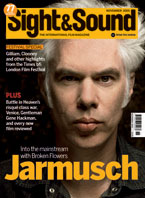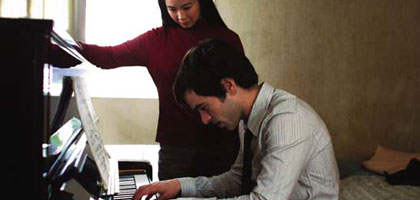Primary navigation


Adapted from James Toback's 1977 Fingers, Jacques Audiard's film suggests French cinema is falling in love again with Hollywood. By Philip Kemp
Time was, passion for American cinema ran high in France. From the Liberation through the glory years of the nouvelle vague, Hollywood movies provided French film-makers with a seemingly bottomless resource-pool of ideas, styles, themes and cultural references. Directors like Jean-Pierre Melville, Jean-Luc Godard, François Truffaut and Claude Chabrol openly drew on and paid homage to their American confrères. It was French critics and movie buffs who detected and defined film noir, who devised the auteur theory and taught their blinkered Anglo-Saxon counterparts to appreciate Hitchcock and Hawks, Robert Aldrich and Nick Ray as artists with their own individual oeuvres and philosophies rather than as mere studio workhorses touting for hire. American pulp-fiction novels got transmuted into twisty French thrillers. Jean-Paul Belmondo did Bogart. Alain Delon did Alan Ladd. Bardot did Monroe to Jeanne Moreau's Jane Russell. Everybody adored Sam Fuller, Gene Kelly and (American-period) Fritz Lang, and begged them to take cameo roles in their movies.
Hollywood, on the whole, reacted with bemused incomprehension, nervously suspecting that these excitable foreigners might be taking the piss. A few film-makers, more adventurous and open-minded than the rest - Arthur Penn, Robert Altman, the young Martin Scorsese - looked closely at what the French New Wave was up to and learnt from their technical audacities. One or two, like John Frankenheimer, Joseph Losey, even Ray, were seduced into making films in France, and lived to regret it. Others kept their homage at cautious arm's length: Quentin Tarantino named his production company, A Band Apart, after his favourite Godard movie. ("Why doesn't he just give me the money?" growled Jean-Luc, truculent as ever.) But on the whole Hollywood simply kept doing what it had always done, right back to the days of Pépé le Moko - cherrypicking French box-office hits and Americanising them. In most cases, rather badly.
But the reverse process - taking American films and remaking them - was the one thing French film-makers never seemed much inclined to do. Sure, the sardonic, noirish novels of Jim Thompson, Patricia Highsmith and their ilk provided fertile material for René Clément, Bertrand Tavernier, Claude Miller, Louis Malle, Chabrol, Truffaut and plenty more. Objets sacrés, too - iconic American-style cars, coats, hats, cigarettes, lighters, shades and nightclubs - fetishised the look of a thousand Gallic movies, with cool American jazz sprinkling class over their soundtracks. But just tamely remake a whole film? Why bother? And besides, over recent years, with the local industry's resentment of (and spirited resistance to) American 'cultural colonialism', the transatlantic love affair has cooled.
Which makes Jacques Audiard's The Beat That My Heart Skipped something of an unusual phenomenon: a French remake - and, in terms of plot and character, a pretty close one - of an American film. (Although not quite so unusual, it seems, as one might think: Jean-François Richet's remake of John Carpenter's Assault on Precinct 13 was released earlier this year.) Audiard's model is James Toback's 1977 directorial debut Fingers, in which Harvey Keitel - then ten years into his career and with the bitterness showing in his face as he watched De Niro scooping the roles that should have been his - plays a New York would-be concert pianist acting as brutal debt collector for his dad, a minor foot-soldier in the mob.
Fingers , it must be said, hasn't worn too well. Once hailed by David Thomson as "the best first film by an American director since Badlands", an indie lesson in cool attitude, tersely oblique dialogue and unflinching violence, it now looks over-determined and more than a little self-consciously cultish in its existential pouting. The unsavoury streak of misogyny, which could at the time be passed off as reflecting the attitude of the characters, now appears part of the film's essence. Gaping holes in the plot seem slapdash and offhand rather than disarmingly informal, and a would-be 'zany' moment in which a jailed Jimmy (Keitel) defuses some prison violence by offering to "sing you all some Bach" leaves the viewer wondering why his inmates don't kick the shit out of him.
What the film still has going for it is some vivid location work on the streets of Manhattan's Soho district (then, unlike now, a virtually unexploited resource as far as cinema was concerned), shot in eye-catching wide-angle by Mike Chapman - plus a performance of furious, splintering intensity from Keitel at the quivering peak of his early form. The final shot as Keitel sits naked, glaring into the camera like a caged animal, his eyes a dark abyss of turmoil and fear, while his tape recorder fills the room with cascades of sublime Bachian rationality - from which Jimmy knows he's now irrevocably sundered himself - has lost not a fraction of its unnerving impact.
But all in all, Audiard's remake doesn't need excuses; no deathless masterpiece is being traduced here. The Beat That My Heart Skipped (wretchedly clumsy title) is an updating, a rethinking and, in most ways, an improvement on Toback's original. We're now in modern-day Paris, and our young anti-hero, Thomas Seyr, is no longer coasting the fringes of the mob. Instead, he's a member of a looser, less hierarchical organisation, a small group operating at the nastiest and most unprincipled end of the property market. He and his associates (they scarcely seem to be 'friends') go round violently evicting the poor and destitute from buildings where it looks like a fat profit's to be made from resale. It's not even stated clearly that their victims are squatters; they may well be legitimate tenants that some Mr Big wants out.
As in his previous movies, Audiard evidently doesn't give a fig whether or not we like his protagonist. As played with icy dispassion by Romain Duris (Exiles, Le Divorce), Tom is, if anything, an even nastier piece of work than Keitel's Jimmy. The latter's victims do at least genuinely owe money (if only to his scuzzbag of a dad), while the wretches targeted by Tom and his associates just happen to be standing in the way of some corporate juggernaut. Strangely, this lack of conscience makes him more convincing in his other life as a once gifted piano prodigy. There's a calm detachment, a not-quite-of-this-worldliness about even the most passionate and engaged of the great concert pianists (think Glenn Gould or Sviatoslav Richter) that doesn't sit with Jimmy's overheated frenzy. When Keitel goes to audition for an impresario, we know he doesn't stand a chance. With Duris - especially after coaching from Lin-Dan Pham's fastidious Miao-Lin - it seems just possible he might succeed.
Altogether, Audiard's movie hangs together better than Toback's: it's more coherent in its construction, far less arbitrary in its dialogue, and more plausible and considered in its characterisation. The ending, with Tom violently attacking but not killing the man who had his father rubbed out, is more convincing. (It was a good move on Audiard's part, too, to drop Tom/Jimmy's melodramatically deranged mother.) Not that Audiard lets himself be tempted into a feelgood ending. The final shot, with Tom sitting bruised and bloodstained among the well-heeled punters at Miao-Lin's concert, suggests that the violence he experienced may have marked him for ever. The visceral intensity of Toback's end-shot is missing, but nothing of its fatalism.
So could we just possibly be looking at the first frisky sparks of a rekindling of the traditional Franco-American love affair? Are we witnessing a daring re-eroticising of the tired old transatlantic bedroom routine of decades past? Instead of flabby Hollywood retreads of Gallic box-office hits, can we anticipate fresh revivifyings of those seminal but flawed movie classics of the US counter-culture, all modishly spruced up in smart new gilets? Cavalier facile, anyone?